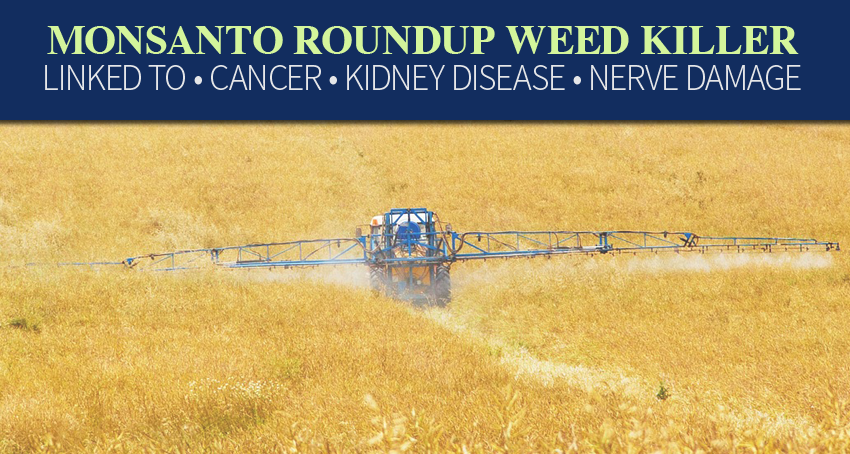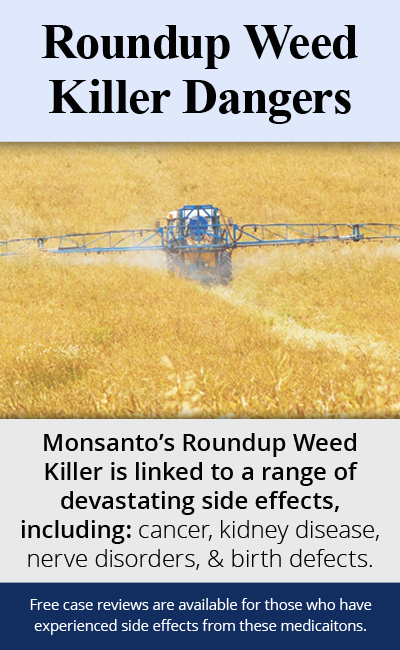The link between Roundup and cancer is believed to be associated with the pesticide’s active ingredient, glyphosate, which the IARC says is “probably carcinogenic,” or cancer-causing. Unfortunately, because non-Hodgkin lymphoma can have a latency period of five to 20 years, people exposed to Roundup weed killer through direct skin contact may have the cancer for years without even knowing it. The risk of cancer is present for individuals ranging from those who simply use the product in the yards or gardens to individual who work in landscaping or on farms.
How is Roundup Used?
Whether or not you’ve handled Roundup yourself, you’ve probably been exposed to the allegedly harmful herbicide, which has been used frequently in American households since the 1970s, and sprayed on millions of acres of farmland since the 1990s. According to a Consumer Reports article published in March 2015, “The herbicide glyphosate, known by the commercial name Roundup, is the most commonly used agricultural pesticide in the U.S. on farms.” What’s more, “Glyphosate use has increased tenfold in the past 20 years thanks to the rise in genetically modified corn and soy.” Most of these corn and soy crops are designed to be resistant to glyphosate, which means the pesticide can be sprayed liberally on fields, farms and even in home gardens, killing the weeds without risk to the crops.
Recent research has found that Roundup may increase the risk of serious illnesses among people who come in direct contact with the herbicide, i.e. people who are spraying it, workers in the vicinity of fields where Roundup is sprayed, and people handling soil contaminated with Roundup. The scary part is, Roundup can also end up in our food, but we have no idea how much of it does, because the government doesn’t regularly test produce for it. And when Roundup and other pesticides are applied to farms, fields or home gardens, their residues can end up in our drinking water. People in close proximity to these areas can also breathe in some of the product without even realizing it. As Charles Benbrook, Ph.D., of Washington State University so aptly puts it, “When a single pesticide is used that widely, people can’t help but be exposed to it.” Sadly, this means that millions of people in the United States have been exposed to Roundup, many unknowingly, and may now be at risk for non-Hodgkin lymphoma or other serious side effects.
What is Non-Hodgkin Lymphoma?
Non-Hodgkin lymphoma is a deadly form of cancer that begins in the lymphatic system, a disease-fighting network of organs and tissues that help rid the body of toxins and other waste, and can spread to other parts of the body via tumors that develop from lymphocytes, a type of white blood cell that is part of the body’s immune system. There are different types of NHL, the most common being follicular lymphoma and diffuse large B-cell lymphoma, both of which involve the body’s B cells, tasked with producing antibodies to help fight infections. Some common symptoms of non-Hodgkin lymphoma include:
- Painless, swollen lymph nodes in the neck, groin or armpits
- Chest pain, trouble breathing or coughing
- Abdominal pain or swelling
- Fever
- Fatigue
- Weight loss
- Night sweats
For individuals with NHL that is aggressive or causes noticeable signs or symptoms, treatment may include chemotherapy, radiation therapy, or a stem cell transplant to kill off the lymphoma cells and replace them with healthy stem cells.
Consult the Knowledgeable Roundup Cancer Lawyers at Monroe Law Group Today
Non-Hodgkin lymphoma is a deadly type of cancer, and more than 72,000 new cases of NHL are expected to be diagnosed in the United States this year, with 20,000 or more patients expected to die from the disease. The Monroe Law Group is accepting claims from individuals that were exposed to Roundup 3 or more times in a year and exposure can be from industrial use or from use in your own home or garden. Occupations that require workers to handle Roundup directly or indirectly may face the greatest risk of NHL, including nursery or greenhouse workers, crop farm workers and laborers, soil scientists and surveyors, and agricultural equipment operators. Recent product liability lawsuits filed against Monsanto, the maker of Roundup, allege that the company knew about the risk of cancer for more than 30 years, but failed to provide warnings to workers in the agricultural industry. If you were exposed to Roundup weed killer at work in 2003 or later, and you were under 65 years of age at the time of your cancer diagnosis, you may be entitled to compensation for your injuries, medical expenses, pain and suffering, and other related damages. Contact the experienced Monsanto Roundup attorneys at Monroe Law Group today to find out if you have a claim against Monsanto.


